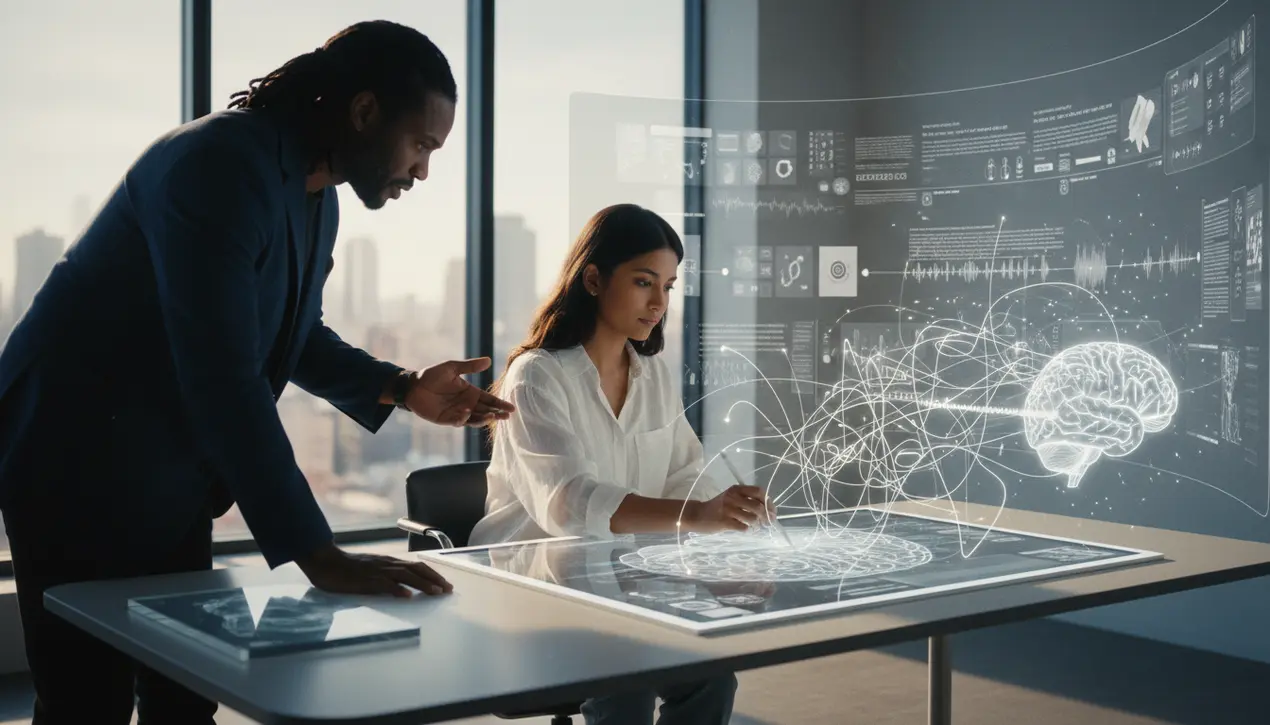
AIgenerative aiAI in Design and Art
Can AI unlock a new generation of human creativity?
SO
Sophia King
2 hours ago7 min read2 comments
When the camera first captured the world in 1826, a collective anxiety washed over the art community, a fear that painting, in its traditional form, was facing obsolescence. Yet, rather than extinguishing the flame of creativity, this new technology acted as a catalyst, forcing a glorious reinvention.Painters, liberated from the burden of pure representation, plunged headfirst into the subjective, giving birth to the blurred, light-dappled dreams of Impressionism with Monet, the raw, psychological intensity of Expressionism with Munch, and the fragmented, perspective-shattering visions of Cubism with Picasso. The tool didn't replace the artist; it redefined the canvas of possibility.This pattern of technological fear and subsequent creative explosion repeated itself decades later with the dawn of the personal computer. Skeptics worried that these logical machines would stifle the messy, beautiful process of human imagination.Instead, they became the ultimate sandbox, birthing entire industries of digital design and computer animation. Studios like Pixar, which emerged from this digital frontier, didn't just tell stories; they built worlds, rendering the impossible with a fidelity that hand-drawn animation could never achieve, proving that technology could be the most powerful brush in an artist's kit.Then came Photoshop, and with it, a new wave of purist panic among photographers who saw digital manipulation as a betrayal of the medium's truth. What actually happened was an unprecedented democratization of visual artistry.Photoshop, and tools like it, lowered the barrier to entry, allowing a new generation of creators to manipulate reality, design graphics, and build the very foundation of the modern creator economy. So why, then, does the current wave of artificial intelligence provoke such a visceral sense of threat among today's creators? The historical record is unequivocal: new technology has never replaced creativity; it has consistently expanded its horizons.Each technological leap, from the loom to the lens, has been met with resistance, only to be followed by a period of profound progress and artistic flourishing. AI is not an exception to this rule; it is simply the next tool in the lineage, a powerful engine that can help creators iterate faster, explore a wider landscape of ideas, and translate the nebulous visions in their minds into tangible reality with fewer technical and resource-based obstacles.The core of human imagination—that ineffable spark that evokes tears from a poignant line of dialogue or a swoon from a haunting melody—remains stubbornly, beautifully human. This intangible side of creativity, born from lived experience, unique perspective, and raw talent, cannot be replicated by pattern recognition algorithms.However, the journey from that internal spark to a shared external experience is often fraught with tangible roadblocks: time, cost, specialized skills, and access to resources. This is the chasm where countless great ideas languish.AI cannot imbue a work with soul, but it can function as a monumental force multiplier, demolishing these barriers to entry. It can lower the cost and time required for prototyping, provide real-time feedback on narrative pacing, or generate a musical score to accompany a story, effectively democratizing the tools of creation in the same way the smartphone universalized photography.In my own work developing an audio storytelling platform, I've witnessed this collaborative dynamic firsthand. We built AI tools not as automated authors, but as creative partners.They help writers maintain consistency across sprawling, hundreds-episode narratives, suggest potential plot twists during bouts of writer's block, and offer insights on dialogue flow. Other tools seamlessly convert text into natural, expressive audio, add immersive soundscapes, and generate cover artwork—capabilities that were once the exclusive domain of well-funded professional studios.These tools aren't taking jobs; they are opening doors. Many of our most beloved creators could never have afforded to hire voice actors, sound designers, or illustrators.Without AI, their stories would have remained silent, trapped in documents. With it, they are reaching millions of listeners globally.This isn't about replacement; it's about radical inclusion, about expanding the very definition of who gets to be a creator. The imperative, then, is to architect these new creative systems with the human firmly at the center.Great art doesn't emerge from statistical probability; it erupts from emotion, contradiction, and a deep, human curiosity about the world. An AI can suggest a story structure, but it cannot feel the ache of heartbreak or the flutter of hope.We must ensure transparency in how these tools operate, maintain ironclad creative ownership for the originators of ideas, and deeply value the human touch that gives art its meaning. We are standing at a pivotal moment in this long, unfolding story.Steve Jobs once poetically described the personal computer as a 'bicycle for the mind'—a tool that amplifies our innate capabilities rather than replacing them. This is the precise potential of AI in the creative sphere: a bicycle for the creative mind.It can help human talent travel farther and faster, exploring territories of imagination previously thought unreachable. The future of storytelling shouldn't be a cold, automated output. It should be a warmer, richer, more diverse ecosystem, filled with more humans telling more stories, reaching more people, and inspiring more imagination—and yes, more tears and swoons—than ever before.
#featured
#artificial intelligence
#creativity
#technology
#human imagination
#collaboration
#storytelling
#future of art
Stay Informed. Act Smarter.
Get weekly highlights, major headlines, and expert insights — then put your knowledge to work in our live prediction markets.
Related News
Comments
Loading comments...
© 2025 Outpoll Service LTD. All rights reserved.